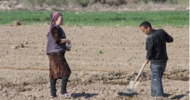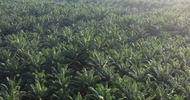One of the world’s largest palm oil producers, First Resources, appears to have secretly controlled a network of companies that have been clearing rainforests in Indonesia for more than a decade, an investigation by The Gecko Project has found.
- The Gecko Project
-
13 November 2023
In southern Cameroon, about 150km from the border with the Democratic Republic of Congo, a bitter story from the colonial era is playing out. Rubber companies are once again destroying rainforests and communities.
- Dailly Maverick
-
11 July 2023
Big producers eye growth and China market, but must drill for water – to depths small farmers cannot reach.
- Diálogo Chino
-
10 May 2023
Forests in Cambodia have seen large-scale deforestation with rubber and cassava plantations, illegal logging and other economic interests, but despite the criminalisation, communities are fighting back
A Mongabay investigation into land-grabbing in the Brazilian Amazon has led to the suspension of the sustainability certificate of the country’s second top palm oil exporter
Canada's Blended Finance Project interviews Witness Radio and GRAIN about the role public development banks play in facilitating land grabs around the world.
Did Indonesia just save a forest the size of Belgium? Or open the floodgates for its destruction? One giant, controversial palm plantation development, whose permits were among those cancelled, will be a crucial test.
The handful of companies that control industrial palm oil production in West and Central Africa have been linked to numerous social and environmental impacts, violating their buyers’ NDPE commitments.
Land is spiritual, land is ideological, and we cannot afford to give it away for the economic benefits of the investor, argues Professor Sam Lwanga Lunyiigo
A company owned by the Canadian Public Sector Pension Investment Board has maintained a single-minded focus on controlling East Maui water since it bought 41,000 acres of ag land in November 2018.
- Politics on Maui
-
20 January 2022
Institutional investors and foreign countries alike increasingly see U.S. farmland as a sound investment, raising concerns.
- Progressive Farmer
-
01 November 2021
GRAIN reflects on a new report on large scale land acquisitions by the Land Matrix Initiative.
The heavily forested Sangha region in the Republic of Congo is almost entirely occupied by three concessions, including one held by the palm oil company Eco-Oil Energie SA.
In July 2021, a French court ruled against a group of Indigenous Bunong farmers from Mondulkiri in Northeastern Cambodia. In light of recent discussions on the potential and constraints of legal activism, we aim here to highlight entrenched structural factors that can hinder communities in legal challenges to corporate land grabs.
- Political Ecology Network
-
11 August 2021
In Colombia, big agribusinesses, cattle ranchers, transnational corporations, and wealthy landowners have been able to claim land that is not theirs by acquiring titles through a legal system farming families have no access to.
- Labour Notes
-
08 January 2021
In Liberia, human rights have allegedly been violated on rubber plantations managed from Switzerland. Instead of taking up mediation offers, the Socfin group prefers to act against its critics.
- Bread for all
-
26 November 2020
Observers and activists have raised concerns about the leading role the Indonesian government plans to give to the military and to big corporations in a program to establish vast crop plantations across the country.
Thousands of families are being violently evicted from their farms to make way for foreign-owned plantations in Kiryandongo, Uganda.
- Witness Radio et al
-
25 August 2020
The invasion of large scale cattle breeding in areas inhabited by traditional populations is widespread in the Amazonian area.
- Climatechange News
-
27 July 2020
While palm oil companies present themselves as benevolent donors during the pandemic, communities living in and around these plantations tell another story.
On 20 May 2020 villagers from Ijaw-Gbene in Okomu Kingdom had their homes burnt down by agents of the Nigerian subsidiary of the Luxembourg-based SOCFIN plantations company.
- Galaxy Television
-
16 June 2020
"Have you ever seen a communications specialist of a corporate group admit, without blinking, to the exploitation of minors by subcontractors? That is what happened to us in Cameroon," explains RTBF journalist Emmanuel Morimont
When Gulf nations face food, security, and water scarcity issues, one response is to seek lucrative agricultural investments in fertile African lands. Yet, while such deals can bring benefits to the countries involved, there are also sizeable risks
The European Union spends $65 billion a year subsidizing agriculture. But a chunk of that money emboldens strongmen, enriches politicians and finances corrupt dealing and land grabs.
Agribusiness—especially soy, sugar, palm oil, and beef production—was the second deadliest sector for people standing up for the environment and their lands.
- Civil Eats
-
02 August 2019
By buying up US farmland and leasing it to large-scale farm machinery operators, TIAA is closing the door on policies that could revive the more diversified farming that used to underlie healthy local economies.
- ActionAid USA
-
08 July 2019
Roundtable for Sustainable Palm Oil (RSPO) is working to bring sustainable palm oil into the “mainstream”. The RSPO aims to advance production, procurement, finance and use of sustainable palm oil products and not shy away from two key challenges on the horizon: winning over smallholders and African producers.
- Food Navigator
-
05 April 2019
Little of the 5 million acres [2.02 million hectares] that Sudan's agriculture ministry estimates are in foreign hands—perhaps less than 1 in 20 acres—has been cultivated.
Myanmar's new land law amendment has its roots in a British colonial notion of “wasteland” that consciously undermines customary land claims of highland communities to the benefit of foreign investors and tax collectors.
Illegally banana plantations backed by obscure nexus of Chinese investors are making quick profits for some, but fuelling land conflict and environmental degradation in Kachin province, Myanmar.
- Frontier Myanmar
-
17 January 2019















